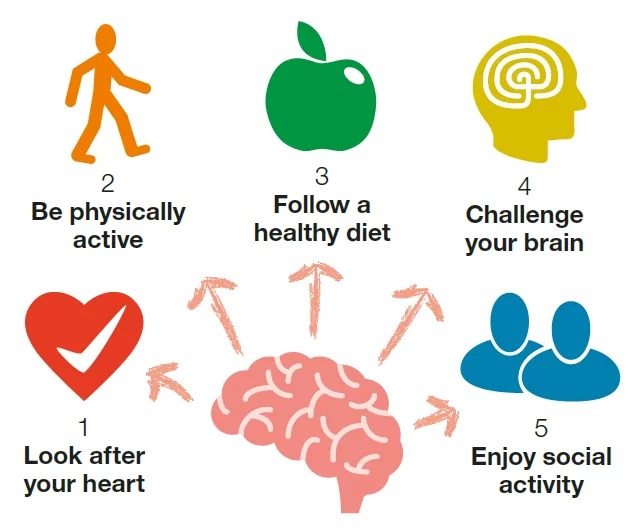
Alzheimer’s disease (AD) is one of the most pressing health challenges of our time. As a progressive neurodegenerative disorder, it primarily affects memory, thinking, and behavior. With no cure currently available, researchers and healthcare professionals have turned their attention to prevention strategies. Emerging evidence suggests that a healthy lifestyle can significantly reduce the risk of developing Alzheimer’s disease. This article explores various lifestyle factors that can contribute to brain health and potentially prevent Alzheimer’s.
Understanding Alzheimer’s Disease
Alzheimer’s disease is characterized by the accumulation of amyloid plaques and tau tangles in the brain, leading to neuronal damage and cognitive decline. Symptoms typically start subtly, with mild memory loss, but progressively worsen, affecting daily life and eventually leading to loss of independence. By understanding the risk factors and protective measures, individuals can take proactive steps toward brain health.

The Role of Diet
1. Nutritional Choices
Diet plays a crucial role in overall health, including brain function. Research indicates that certain dietary patterns are associated with a reduced risk of Alzheimer’s:
Mediterranean Diet: Rich in fruits, vegetables, whole grains, nuts, and healthy fats (especially olive oil), this diet emphasizes foods high in antioxidants and omega-3 fatty acids. Studies have shown that adherence to the Mediterranean diet is linked to improved cognitive function and a lower incidence of Alzheimer’s.
DASH Diet: Originally designed to combat hypertension, the Dietary Approaches to Stop Hypertension (DASH) diet emphasizes fruits, vegetables, lean proteins, and low-fat dairy. Its focus on nutrient-dense foods is beneficial for brain health.
MIND Diet: The Mediterranean-DASH Diet Intervention for Neurodegenerative Delay (MIND) diet combines elements from both the Mediterranean and DASH diets, specifically targeting brain health. It encourages the consumption of leafy greens, berries, nuts, and fish, all of which have been linked to cognitive benefits.
2. Specific Foods to Include
Berries: Rich in antioxidants, particularly flavonoids, berries have been shown to improve communication between brain cells and reduce inflammation.
Leafy Greens: Vegetables like spinach, kale, and broccoli are high in nutrients that support brain health, including vitamin K, lutein, and beta carotene.
Fatty Fish: Sources of omega-3 fatty acids, such as salmon, mackerel, and sardines, can promote brain health and protect against cognitive decline.
Nuts and Seeds: Packed with healthy fats, vitamins, and antioxidants, nuts and seeds contribute to overall cognitive function.

Physical Activity
3. Importance of Exercise
Regular physical activity is one of the most effective lifestyle factors for maintaining brain health:
Aerobic Exercise: Engaging in activities like walking, running, swimming, or cycling enhances blood flow to the brain, promoting the growth of new neurons and improving overall cognitive function. Studies suggest that older adults who are physically active have a lower risk of developing Alzheimer’s.
Strength Training: Resistance exercises not only improve physical strength but also have positive effects on cognitive function. They can help enhance memory and processing speed.
Balance and Flexibility: Activities like yoga and tai chi improve balance, reduce fall risk, and contribute to mental well-being. These practices can also help alleviate stress, another factor linked to cognitive decline.
4. Recommended Activity Levels
The World Health Organization recommends at least 150 minutes of moderate-intensity aerobic activity each week, along with muscle-strengthening activities on two or more days. This level of activity is associated with numerous health benefits, including enhanced cognitive function.
Cognitive Engagement
5. Mental Stimulation
Keeping the brain active is essential for building cognitive reserve, which can delay the onset of dementia:
Puzzles and Games: Engaging in crossword puzzles, sudoku, or other brain games can stimulate cognitive function and improve problem-solving skills.
Learning New Skills: Taking up a new hobby, learning a musical instrument, or studying a new language challenges the brain and promotes neural connections.
Social Interaction: Maintaining strong social ties and participating in group activities can reduce feelings of loneliness and depression, both of which are risk factors for cognitive decline. Regular interaction with friends and family helps keep the mind sharp.
Sleep and Stress Management
6. Quality Sleep
Sleep is critical for brain health, as it allows the brain to clear toxins and consolidate memories:
Sleep Hygiene: Establishing a regular sleep schedule, creating a calming bedtime routine, and maintaining a comfortable sleep environment can enhance sleep quality. Avoiding screens before bedtime and limiting caffeine intake can also improve sleep.
Addressing Sleep Disorders: Conditions like sleep apnea should be diagnosed and treated, as they can disrupt sleep and increase the risk of cognitive decline.
7. Stress Management
Chronic stress has been linked to cognitive decline and increased risk of Alzheimer’s:
Mindfulness and Meditation: Practicing mindfulness and meditation can help reduce stress levels and promote relaxation. These practices have been shown to improve cognitive function and emotional well-being.
Physical Activity: Exercise serves as a powerful stress reliever, promoting the release of endorphins and enhancing mood.

Avoiding Harmful Substances
8. Substance Use
Certain lifestyle choices can exacerbate the risk of developing Alzheimer’s:
Quit Smoking: Smoking is associated with a higher risk of cognitive decline. Quitting smoking at any age can improve overall health and reduce the risk of Alzheimer’s.
Limit Alcohol: While moderate alcohol consumption may have some protective effects, excessive intake is linked to cognitive impairment. Guidelines suggest limiting alcohol to one drink per day for women and two for men.
Regular Health Check-ups
9. Monitoring Health Conditions
Regular check-ups and managing chronic health conditions are crucial for preventing cognitive decline:
Cardiovascular Health: Conditions such as hypertension, diabetes, and high cholesterol can impact brain health. Regular monitoring and adherence to treatment plans are essential.
Cognitive Assessments: Early detection of cognitive decline can lead to timely interventions and lifestyle adjustments. Regular cognitive screenings can be beneficial, especially for individuals at higher risk.
While there is no guaranteed way to prevent Alzheimer’s disease, adopting a healthy lifestyle can significantly reduce the risk and promote overall brain health. Emphasizing a balanced diet, regular physical activity, cognitive engagement, quality sleep, and effective stress management can all contribute to a healthier brain.
By incorporating these habits into daily life, individuals not only support their cognitive function but also enhance their overall quality of life. Making these lifestyle choices early on may provide the best defense against Alzheimer’s and foster a healthier aging process, ensuring that individuals can enjoy a vibrant, fulfilling life as they grow older.
With ongoing research and a growing understanding of Alzheimer’s disease, embracing these preventive strategies is more important than ever. The journey to a healthier brain begins with informed choices and proactive measures, paving the way for a brighter future.















